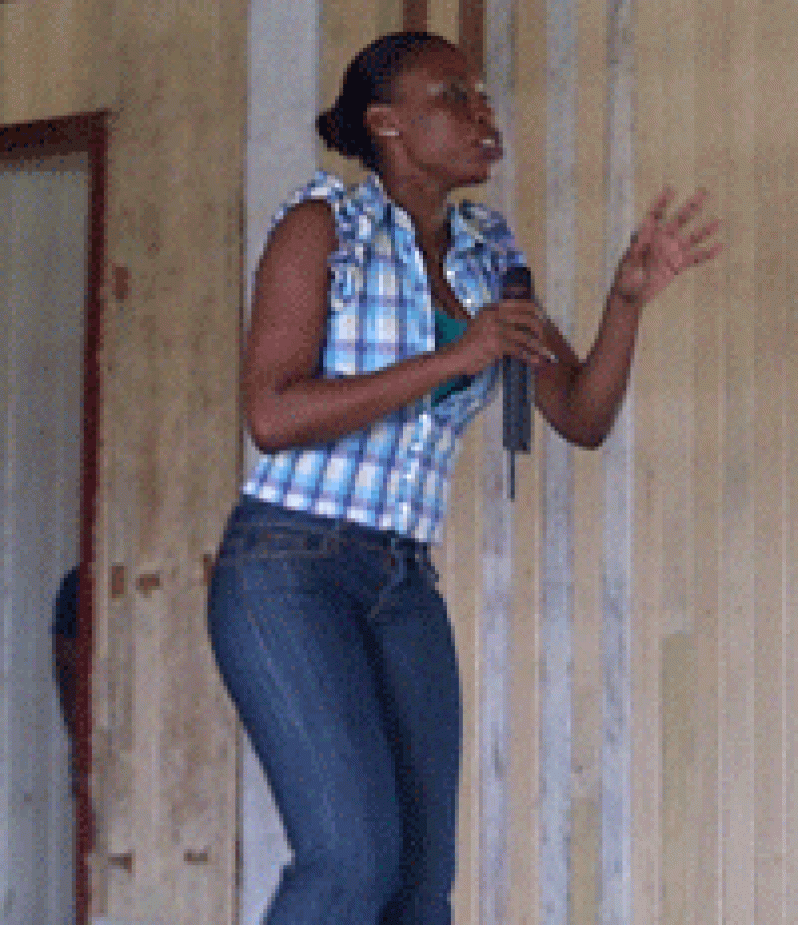-raise awareness on HIV/AIDS
MORE THAN one hundred youths drawn from the Youth Entrepreneurial Skills Training (YEST) facility at the Kuru Kuru Centre on the Soesdyke/Linden Highway were recently the recipients of an educational treat in the form of edutainment, ringing home the message of HIV/ AIDS and other prevalent social issues facing youths daily.  The programme, which was also intended to urge its audience to better their lives as young people, saw youths involved in the President Youth Award, Republic of Guyana scheme performing drama under the direction of coordinator, Marinda Austin, which succeeded in capturing hearts and creating a new learning environment through drama.
The programme, which was also intended to urge its audience to better their lives as young people, saw youths involved in the President Youth Award, Republic of Guyana scheme performing drama under the direction of coordinator, Marinda Austin, which succeeded in capturing hearts and creating a new learning environment through drama.
Caravan of Hope
Through the project, Caravan of Hope, PYARG is hoping to make a greater impact on the lives of youths aged 14 to 25 by providing them with prevention services, with the possibility of greater community outreach by empowering youths to take a lead role in using the  performing arts to reduce risky behaviours in targeted areas, allowing them to make informed choices and lead healthy and productive lives.
performing arts to reduce risky behaviours in targeted areas, allowing them to make informed choices and lead healthy and productive lives.
In short, it’s about a decentralized approach to services, training and awareness/information relating to HIV/AIDS.
The Award secretariat believes that:
1. More emphasis should be given to HIV/AIDS prevention programmes promoting primary behavioural change –such as delay of sexual initiation and reduction in number of sex partners. There should also be more involvement on the part of faith-based organizations, since promoting abstinence is one of their fundamental principles.
2. It is being said that “until a vaccine is found, the only way to prevent new HIV infections is through education”. But people need more than good intention and education, which is usually passed on through workshops/outreaches. They also need practical examples and continued support on how they themselves can become vehicles of change within their communities.
Adolescents can protect themselves if they are given comprehensive information and the tools, skills, and reasons to use them. It is incumbent on all adolescents to  demonstrate personal responsibility by protecting themselves and others. Communities promoting the close cooperation of parents, teachers, coaches, clergy, physicians, and other adults interacting with youth can ensure that every young person has access to this information. Every adult who touches a young person’s life should be equipped to impart this knowledge in a clear, accurate and sensitive manner.
demonstrate personal responsibility by protecting themselves and others. Communities promoting the close cooperation of parents, teachers, coaches, clergy, physicians, and other adults interacting with youth can ensure that every young person has access to this information. Every adult who touches a young person’s life should be equipped to impart this knowledge in a clear, accurate and sensitive manner.
3. More must be done to educate the parents of adolescents about the risks their children face, and about the means that are available to protect their children from those “risks”. Parents can be the best teachers for their children, and HIV prevention approaches for adolescents should ideally start with parents. Parents should be key participants in HIV prevention efforts. If parents aren’t convinced of the risk to their children, they may fail to recognize their children’s “risk-taking” behaviours.
4. Effective behavioural change, including HIV prevention, is neither a single programme nor a single event. It must take place over the course of many years, and be developmentally appropriate. Therefore, a holistic approach, focusing on HIV prevention from sexually transmitted disease prevention, pregnancy prevention, substance abuse prevention, sexuality education, self-esteem activities, and human development education, is inadvisable.
5. Efforts to encourage sexual abstinence should continue to be supported. Teens who are thinking about becoming sexually active should be encouraged to consider the implications of their decision, and to examine whether they are prepared to deal responsibly with these behaviours (including taking personal responsibility for the consequences of these behaviours, and protecting themselves and their partners against disease and unintended pregnancies).
It is important that young people make healthy and safe choices about sex. To help them make those decisions, families and communities should help their young citizens to grow and develop to their full potential, and provide them with a safe environment to accomplish that growth through schools, role models, and other opportunities. Without community support and reinforcement, even the best HIV prevention approaches will falter or fail.
The President’s Youth Award: Republic of Guyana (PYARG) project is a voluntary programme that provides young people between the ages of 14 and 25 years with a balanced programme of activities for individual development.
The Award is recognized nationally as the programme of choice for young people, and was awarded a Medal of Service for its achievements over the years.
The success of the programme is mainly due to the support given by unit leaders, regional award leaders, parents, volunteers and all who give of their time, efforts, skills and facilities to ensure the development of young people.



.jpg)








